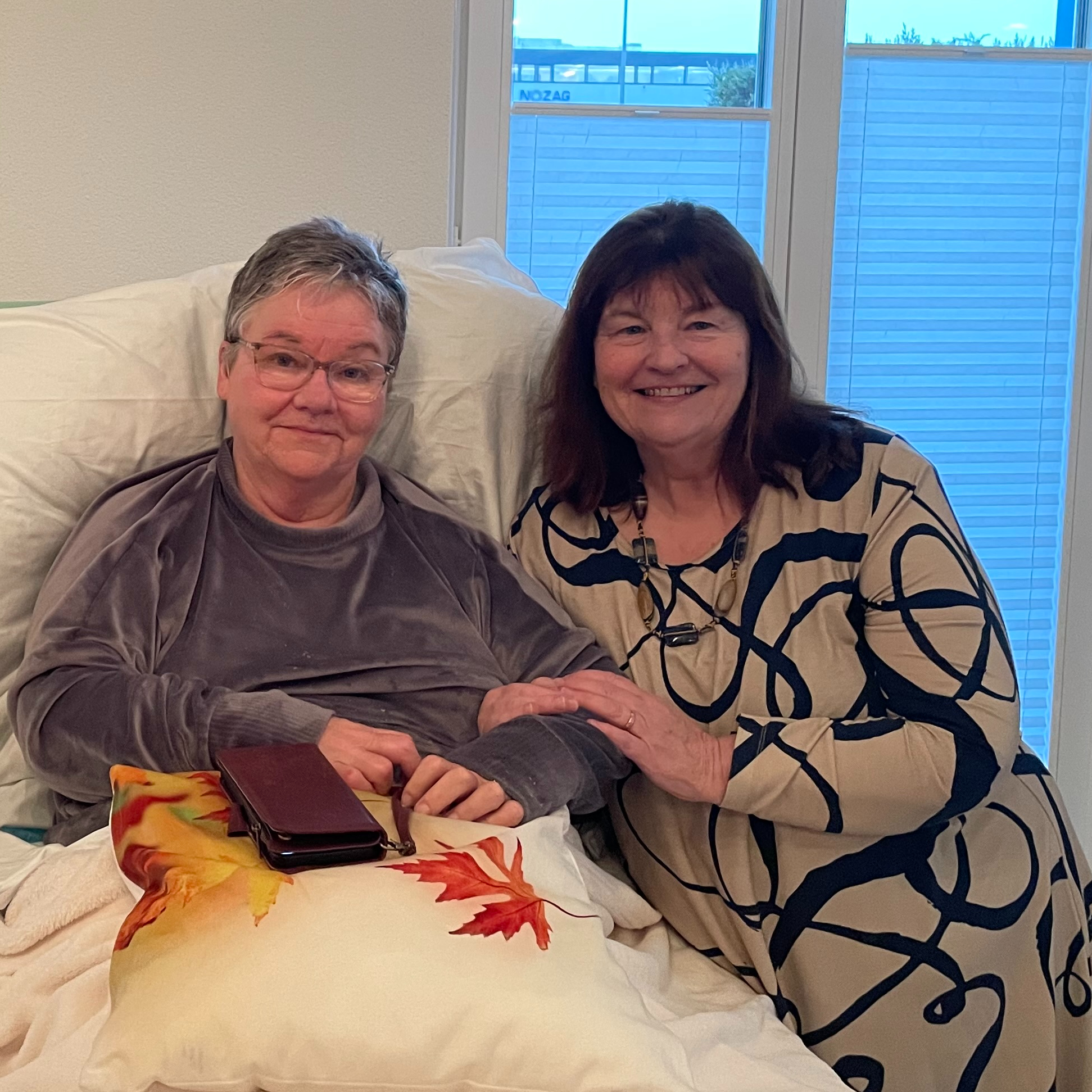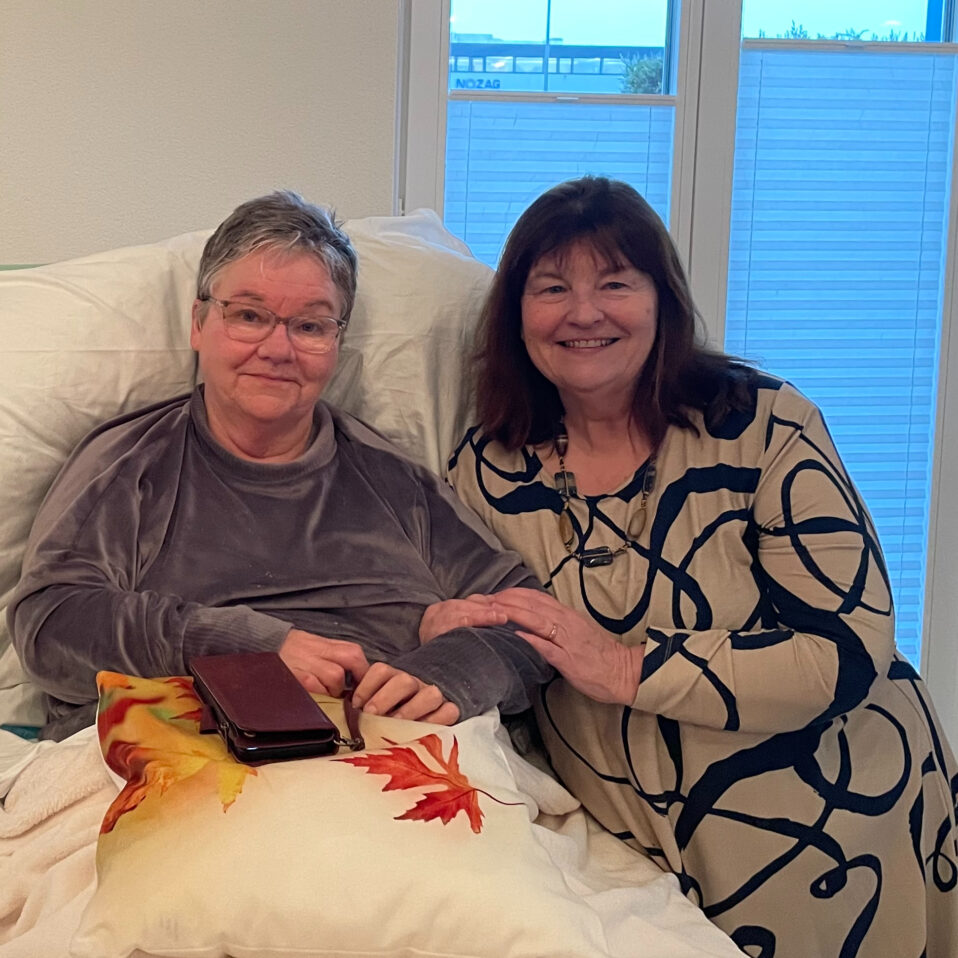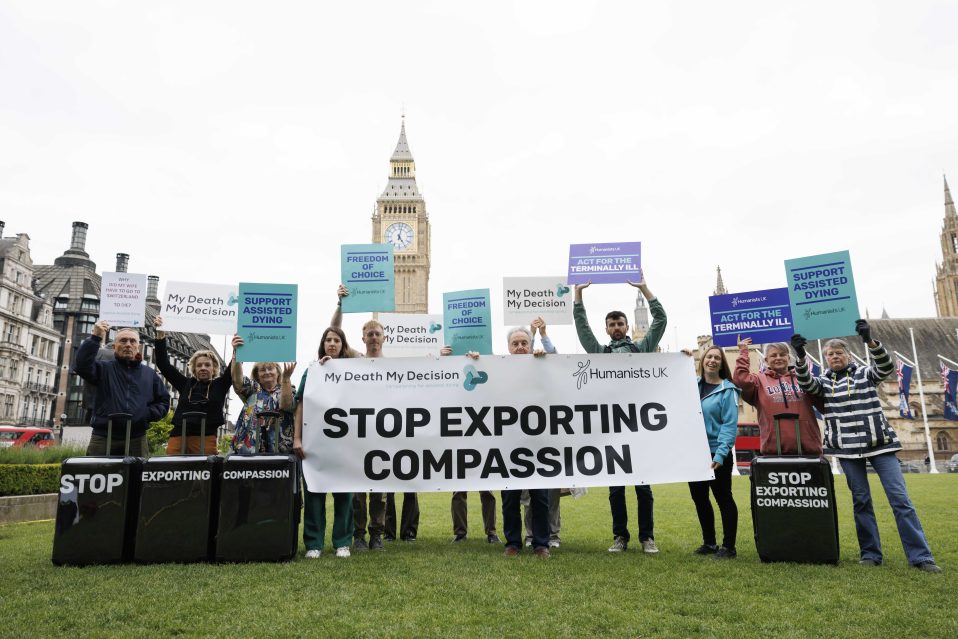
Sharon Johnston (left) with Sue Lawford (right) at Dignitas, Switzerland
My Death, My Decision can now disclose that one of our members was earlier this year arrested at 5.30 am, put in a cell and held for 19 hours, and then subjected to a six-month police investigation, for escorting a woman to receive a medically assisted death in Switzerland.
The person she assisted was 60-year-old Sharon Johnston from Cardigan, who became tetraplegic following a fall at her previous home in Aberystwyth. Sharon spoke publicly about her wish to have an assisted death in 2021 BBC documentary When Would You Want to Die?
Sue Lawford, Co-chair of My Death My Decision Wales, originally from London and now living in Cardiff, says that the saga shows the urgent need to reform the UK’s assisted dying laws. Sue will be talking to MPs and Lords about her experience today at My Death, My Decision’s event in parliament.
Sue accompanied Sharon on 14 February to Heathrow Airport, en route to Dignitas in Switzerland. On the way to the airport Sharon was contacted by Dyfed Powys Police and Social Services several times; she reassured both that she was okay.
Sue accompanied Sharon to Dignitas to provide support. When Swiss Police arrived at Dignitas, Sue and Sharon reassured them and they were satisfied there was no illegal activity. They left without taking any action. Sharon then had a calm, peaceful death early on the morning of 15 February. Her last words were: ‘This is a lovely feeling.’
The same day, Sue returned home to Cardiff. On 16 February at 5.30 am she was woken by the Police. Sue was arrested for assisting a suicide and was placed in the back of a police van and driven to Cardiff Bay Police Station. Meanwhile, police officers searched her house for over four hours. They seized her phone, electronic devices, passport, and documents relating to her work. They also took away electronic devices belonging to her husband, who had no connection whatsoever with the case.
Sue was kept in a police cell for 16 hours, before being interrogated by Dyfed Powys Police, with a duty solicitor in attendance. After over 19 hours in custody, she was released ‘pending investigation’. That investigation was dropped after six and a half months, due to ‘evidential difficulties’. Sue says being under arrest for such a long time was detrimental to her mental health.
Her possessions, and those of her husband, were only returned at the end of the investigation.
According to data from YouGov, 79% of people in the UK believe that people who provide practical help to someone to obtain a medically assisted death abroad should not face prosecution.(1)
My Death, My Decision supports the right to die for individuals who are of sound mind, have a clear and settled wish to end their life, and who are terminally ill or incurably suffering. Sharon was not terminally ill as a result of her tetraplegia. Swiss law allows both groups the right to die.
Sue Lawford said:
‘The entire situation caused immense stress and heartache for Sharon on an already difficult journey. It has caused me immense stress and anxiety since our return. The BBC had filmed an entire documentary on Sharon, whose decision was as clear as day.
‘A change in the law in the UK is long overdue. And it shouldn’t be limited to the terminally ill. Sharon’s situation was intolerable, yet could have continued for many years, and there are countless others like her without the means to end their lives on their own terms.’
Trevor Moore, Chair of My Death, My Decision, said:
‘Sharon’s and Sue’s stories show why our current laws are completely broken. The lack of compassion they show in forcing an incurably suffering person to travel abroad for an assisted death, in the most difficult of circumstances, is shameful. For that to be followed by a heavy-handed criminal investigation of someone who acts out of the best of motives in providing help is appalling. That is why we urgently need a compassionate assisted dying law for England and Wales.’
Notes
For further comment or information, media should contact Nathan Stilwell at nathan.stilwell@mydeath-mydecision.org.uk or phone 07456200033.
Sue Lawford is available for interview upon request.
(1) All figures are from YouGov Plc. Total sample size was 1,731 adults. Fieldwork was undertaken between 17th – 18th March 2022. The survey was carried out online. The figures have been weighted and are representative of all GB adults (aged 18+).
Read more about My Death, My Decision’s campaign.
My Death, My Decision is a grassroots campaign group that wants the law in England and Wales to allow those who are terminally ill or intolerably suffering the option of a legal, safe, and compassionate assisted death. With the support of over 3,000 members, we advocate for an evidence-based law that would balance individual choice alongside robust safeguards and finally give the people of England and Wales choice at the end of their lives.
 The Health and Social Care Committee looks likely to launch an inquiry into assisted dying in the new year. The committee’s chair, Steve Brine MP said to his constituents: “look out for what will be a high profile piece of work on assisted dying/suicide in the New Year.” My Death, My Decision welcomes this news and looks forward to working constructively with the committee.
The Health and Social Care Committee looks likely to launch an inquiry into assisted dying in the new year. The committee’s chair, Steve Brine MP said to his constituents: “look out for what will be a high profile piece of work on assisted dying/suicide in the New Year.” My Death, My Decision welcomes this news and looks forward to working constructively with the committee. 







Recent Comments